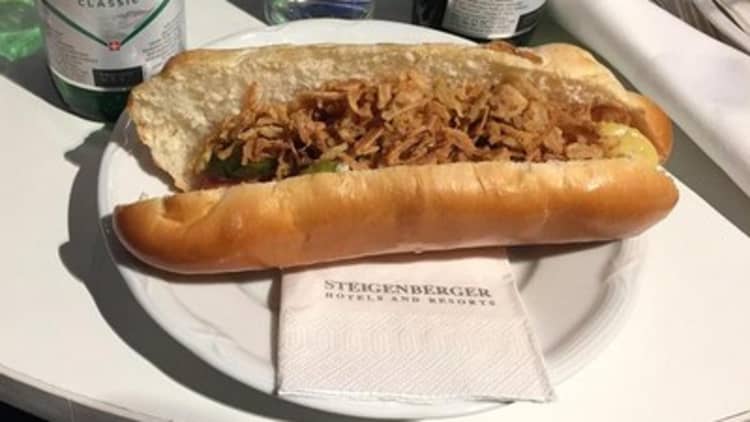
Brother, can you spare $100...for lunch?
Full of global leaders, policymakers, business gurus and the odd music star, the attendees at the World Economic Forum (WEF) at Davos aren't short of a dollar or two. But they might well be at the end of the week—with some of the food prices around town proving to be a little hard to stomach.
At the posh Steigenberger Grandhotel Belvédère, a conference hotspot, even humble menu items can be astronomically pricey. A hot dog with pickles, fried onions and mustard is priced at 38 Swiss francs (about $43.50). It's 48 Swiss francs for a chicken Caesar salad with parmesan (about $55). Separately, a draft beer at a local restaurant—in a pint-sized glass—can cost 6.50 Swiss francs, about $7.50.
Some items seemed priced just for the billionaires floating around WEF but it's a very different mood in the nearby shopping promenade.
Bruna Minelli runs a women's clothing shop. The knitted couture that she sells comes from Italy, meaning the sudden appreciation of the Swiss franc last week - and the cheaper euro - has left her with more than a few problems.
"It has really affected us," she told CNBC. Her current stock has been discounted, although January sales means this is usually the norm, but she said that her next batch would be priced 20 percent lower. With the euro being cheaper, customers of the town of Davos are likely to pick up a bargain in the coming months.
This might seem like a bonus for everyone, but the story doesn't end there.
Davos is primarily a town for tourists. Outside of the World Economic Forum's week, people flock to ski and stay at the hotels and the ski chalets that surround the promenade. In the summer, hikers and walkers take to the hills to take in some of the most pleasant scenery the Swiss Alps has to offer.
And this is where the problem lies with Minelli explaining that a majority of the tourists come from Germany and Austria. With a Swiss franc that's now around 30 percent stronger against the euro than it used to be, there's a real concern that these tourists won't be flocking anywhere near Switzerland, let alone the town of Davos.
Further down the promenade, it was similar story. The owner of Idea Due Mode Davos told CNBC that the lack of snow at the beginning of winter had already negatively affected the town. Her clothing is bought from Paris and was also looking to discount her goods if needed, although she said that some loyal local customers would help prop up her sales. She also spoke of rivals that bought their foreign goods in Swiss francs and, therefore, were currently losing out.
The retailers are now all anxiously waiting on whether the hotel rooms will stay full during the year and for next season, with the summer traditionally being a quieter period for tourists.
At the check-in desk at the Hotel Europe Davos, in the center of town, there was no talk of cutting prices and with the policy announcement by the Swiss National Bank only last week, it's still too early to tell whether the holiday goers have been put off.
Looking further along the town, it becomes clear that shopping in Davos is catered squarely for tourists. There's a shop selling luxury watches, several sunglass stores, cafes, restaurants, bars and boutique clothing stores.
In the local supermarket the mood was very different, selling mainly Swiss food and drink, prices had not gone up or down and were unlikely to anytime soon, according to staff at the Coop. A constant flood of locals suggested that sales were ticking along. And with a slew of supermarkets in the town - including the German discount supermarket Aldi, it looks like the grocery industry used to fighting tough battles.







